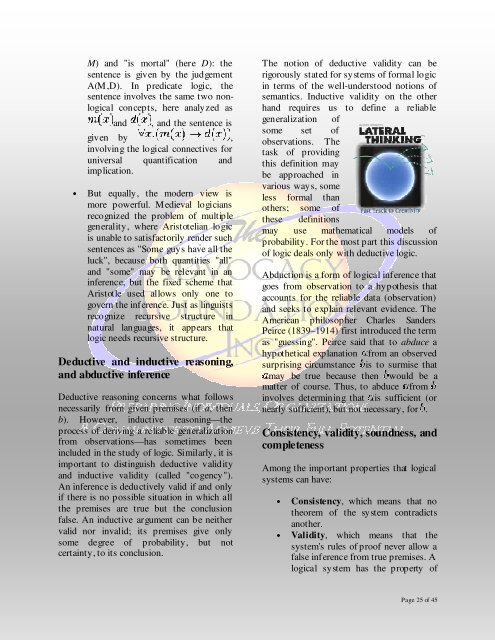Critical Thinking for Transformative Justice
Critical Thinking for Transformative Justice
Critical Thinking for Transformative Justice
Create successful ePaper yourself
Turn your PDF publications into a flip-book with our unique Google optimized e-Paper software.
M) and "is mortal" (here D): the<br />
sentence is given by the judgement<br />
A(M,D). In predicate logic, the<br />
sentence involves the same two nonlogical<br />
concepts, here analyzed as<br />
and<br />
, and the sentence is<br />
given by ,<br />
involving the logical connectives <strong>for</strong><br />
universal quantification and<br />
implication.<br />
• But equally, the modern view is<br />
more powerful. Medieval logicians<br />
recognized the problem of multiple<br />
generality, where Aristotelian logic<br />
is unable to satisfactorily render such<br />
sentences as "Some guys have all the<br />
luck", because both quantities "all"<br />
and "some" may be relevant in an<br />
inference, but the fixed scheme that<br />
Aristotle used allows only one to<br />
govern the inference. Just as linguists<br />
recognize recursive structure in<br />
natural languages, it appears that<br />
logic needs recursive structure.<br />
Deductive and inductive reasoning,<br />
and abductive inference<br />
Deductive reasoning concerns what follows<br />
necessarily from given premises (if a, then<br />
b). However, inductive reasoning—the<br />
process of deriving a reliable generalization<br />
from observations—has sometimes been<br />
included in the study of logic. Similarly, it is<br />
important to distinguish deductive validity<br />
and inductive validity (called "cogency").<br />
An inference is deductively valid if and only<br />
if there is no possible situation in which all<br />
the premises are true but the conclusion<br />
false. An inductive argument can be neither<br />
valid nor invalid; its premises give only<br />
some degree of probability, but not<br />
certainty, to its conclusion.<br />
The notion of deductive validity can be<br />
rigorously stated <strong>for</strong> systems of <strong>for</strong>mal logic<br />
in terms of the well-understood notions of<br />
semantics. Inductive validity on the other<br />
hand requires us to define a reliable<br />
generalization of<br />
some set of<br />
observations. The<br />
task of providing<br />
this definition may<br />
be approached in<br />
various ways, some<br />
less <strong>for</strong>mal than<br />
others; some of<br />
these definitions<br />
may use mathematical models of<br />
probability. For the most part this discussion<br />
of logic deals only with deductive logic.<br />
Abduction is a <strong>for</strong>m of logical inference that<br />
goes from observation to a hypothesis that<br />
accounts <strong>for</strong> the reliable data (observation)<br />
and seeks to explain relevant evidence. The<br />
American philosopher Charles Sanders<br />
Peirce (1839–1914) first introduced the term<br />
as "guessing". Peirce said that to abduce a<br />
hypothetical explanation from an observed<br />
surprising circumstance is to surmise that<br />
may be true because then would be a<br />
matter of course. Thus, to abduce from<br />
involves determining that is sufficient (or<br />
nearly sufficient), but not necessary, <strong>for</strong> .<br />
Consistency, validity, soundness, and<br />
completeness<br />
Among the important properties that logical<br />
systems can have:<br />
• Consistency, which means that no<br />
theorem of the system contradicts<br />
another.<br />
• Validity, which means that the<br />
system's rules of proof never allow a<br />
false inference from true premises. A<br />
logical system has the property of<br />
Page 25 of 45

















